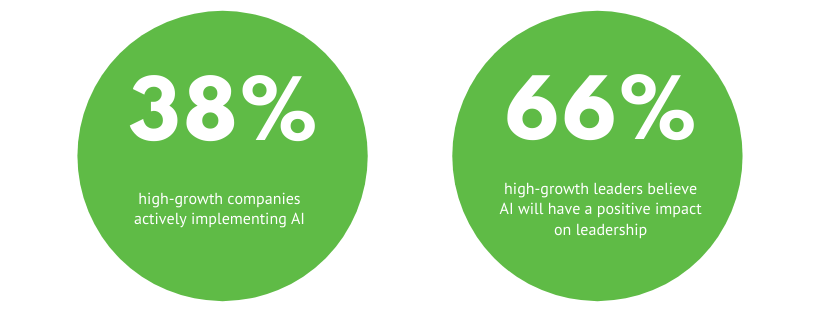Analysts and researchers have studied the impact of artificial intelligence (AI) on industries and economies, but few have focused on how AI will impact leadership.
Have you wondered how AI can impact on your role?
A research from Susan Etlinger, AI analyst with the Altimeter Group, and Heike Bruch, Professor of Leadership at the University of St. Gallen saw 800 leaders across the United States and seven European countries (France, Germany, Italy, Netherlands, Russia, Switzerland, UK) to share how they personally plan to use AI, and their thoughts on how successful leadership changes as businesses use more AI. The key findings are presented below:
- Investing in people
One of the major findings of the study shows that as AI becomes more prevalent in a company, motivating and investing in employees became the top time investment priority for leaders. These results suggest that leaders recognise the impact that uniquely human qualities have on the success of a company.
“I actually think AI will make good leaders less busy and even more human.”
- Heike Bruch, Professor and Director of the Institute for Leadership & Human Resources Management at the University of St. Gallen
- Augmenting skills
The results show that nearly half of successful leaders – namely, those at companies that have seen double-digit growth – are embracing AI to help with direction setting, such as creating a vision or setting a strategy. In comparison, the results show only around 36% of low-growth leaders believe the same.
The study also shows that the majority of successful leaders from high-growth companies are looking to change their skill emphasis in the age of AI, allowing them to focus on more core leadership objectives, such as strategy, goals, and new market opportunities – all things that can happen only through human ingenuity. This suggests that leaders recognise that the way in which they approach their jobs will change and that they welcome support in refining their leadership skills.
- The race is on
The survey results show that high-growth companies are not only more than twice as likely to actively use AI compared to lower growth companies, but they also have bigger plans in a much shorter timeframe.
“What’s striking about the research is the difference between double-digit growth companies and those with lower growth,” says Susan Etlinger, Industry analyst with the Altimeter Group. “What this says to me is that the more you know, the higher your sense of urgency is.”
- Start small, learn fast and scale
The research findings have shown that AI is successfully utilised by leaders to invest more time in humans while helping them create and execute new strategies.
Evidence showing that the fastest-growing companies have invested – and will continue to invest – in AI also highlights the importance of ensuring that business, inspired by their leadership, progress on their AI journey sooner, rather than later, before they run the risk of losing their competitive edge to more progressive companies.
In Microsoft EMEA President Michel van der Bel’s words:
“Start small, but start with intention. This will help teams build trust, learn from feedback and build confidence. In a nutshell, this is what will help get your AI journey off with a strong start.”
- As AI becomes more widely used, leaders will invest more time in:
- motivating and inspiring employees;
- identifying new market opportunities;
- setting the right goals.

- Decision-makers believe AI will have a positive impact on leadership
- Among high growth leaders, 66% say that AI will have a positive impact on leadership, with 8% saying there has already been a positive impact
- 64% of lower growth company leaders expect the same, with 3% saying AI has already had a positive impact
- Key challenges that leaders see, related to AI:
- Adapting rapidly to new and changing market environments (47%)
- Promoting a culture for humans to thrive off AI (41%)
- Developing ideas for how AI can help add value to customer solutions (40%)
Source: Microsoft

